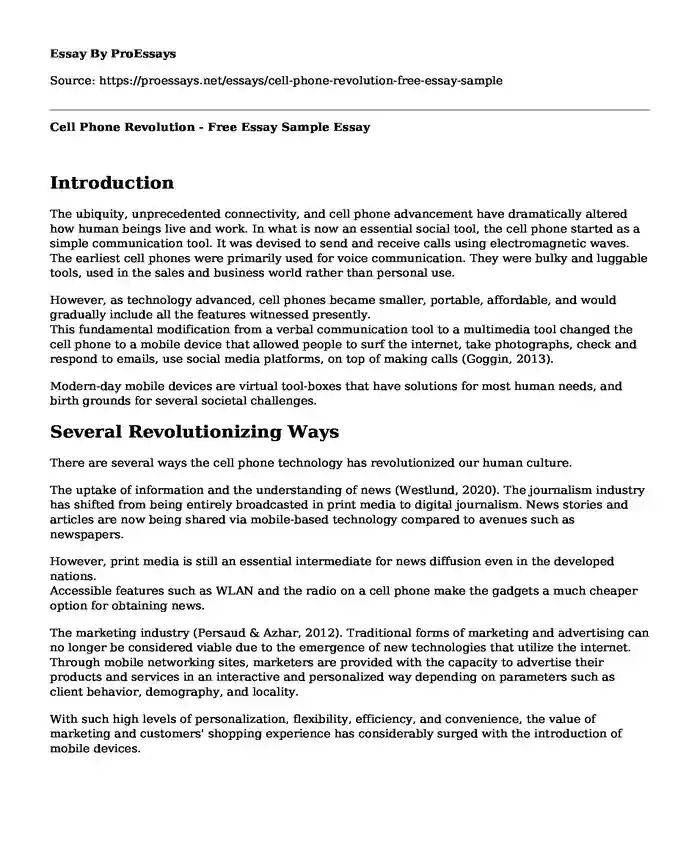Introduction
The ubiquity, unprecedented connectivity, and cell phone advancement have dramatically altered how human beings live and work. In what is now an essential social tool, the cell phone started as a simple communication tool. It was devised to send and receive calls using electromagnetic waves.
The earliest cell phones were primarily used for voice communication. They were bulky and luggable tools, used in the sales and business world rather than personal use.
However, as technology advanced, cell phones became smaller, portable, affordable, and would gradually include all the features witnessed presently.
This fundamental modification from a verbal communication tool to a multimedia tool changed the cell phone to a mobile device that allowed people to surf the internet, take photographs, check and respond to emails, use social media platforms, on top of making calls (Goggin, 2013).
Modern-day mobile devices are virtual tool-boxes that have solutions for most human needs, and birth grounds for several societal challenges.
Several Revolutionizing Ways
There are several ways the cell phone technology has revolutionized our human culture.
The uptake of information and the understanding of news (Westlund, 2020). The journalism industry has shifted from being entirely broadcasted in print media to digital journalism. News stories and articles are now being shared via mobile-based technology compared to avenues such as newspapers.
However, print media is still an essential intermediate for news diffusion even in the developed nations.
Accessible features such as WLAN and the radio on a cell phone make the gadgets a much cheaper option for obtaining news.
The marketing industry (Persaud & Azhar, 2012). Traditional forms of marketing and advertising can no longer be considered viable due to the emergence of new technologies that utilize the internet. Through mobile networking sites, marketers are provided with the capacity to advertise their products and services in an interactive and personalized way depending on parameters such as client behavior, demography, and locality.
With such high levels of personalization, flexibility, efficiency, and convenience, the value of marketing and customers' shopping experience has considerably surged with the introduction of mobile devices.
Solution
Preserving pre-historic arts and documents that could help current, and future generations understand their past and relate to it (Heyworth, 2015). This problem lies with the literature scholars and researchers anxious in extending history and cultural knowledge from the early universe to modern times (Heyworth, 2015).
The youth whose obsession with these gadgets make them forget the importance of socialization (Blitz, 2014). Vulnerable populations subjected to vices such as bullying and victimization.
Failing to maintain the cell phone technology within its appropriate boundaries could lead to a dehumanization factor worldwide (Blitz, 2014). People failing to communicate and connect on the physical realm could lead to people loosing touch with the reality of being human beings.
Conclusion
The cell phone industry will continue to make tremendous leaps and bounds in the future. Most, if not all, industries will become imbedded with these wireless technologies, thereby making our lives simpler, and hopefully better.
However, the real challenge lies in figuring out how to use cell phone technology to enhance our humanity rather than degrading it. Thus, its social, legal, and regulatory barriers must be overcome if we are to actualize its full potential.
References
Blitz, M. (2014). Understanding Heidegger on technology. The New Atlantis. pp 63-80. www.thenewatlantis.com/publications/understanding-heidegger-on-technology
Goggin, G. (2013). Mobile Phone Cultures. Routledge. Retrieved on September 11, 2020, from https://www.routledge.com/Mobile-Phone-Cultures/Goggin/p/book/9780415494991
Heyworth, G. (2015). How I'm discovering the secrets of ancient texts. YouTube. Retrieved on September 11, 2020, from
www.ted.com/talks/gregory_heyworth_how_i_m_discovering_the_secrets_of_ancient_texts#t-469867
Online Learning Insights. (2015). If Technology is the Answer, What Was the Question? Retrieved on September 11, 2020, from
www://onlinelearninginsights.wordpress.com/tag/neil-postman/
Persaud, A., & Azhar, I. (2012). Innovative mobile marketing via smartphones. Marketing Intelligence & Planning doi.org/10.1108/02634501211231883.
Westlund, O. (2010). New (s) functions for the mobile: a cross-cultural study. New media & society 12.1: 91-108. doi.org/10.1177/1461444809355116.
Cite this page
Cell Phone Revolution - Free Essay Sample. (2023, Nov 25). Retrieved from https://proessays.net/essays/cell-phone-revolution-free-essay-sample
If you are the original author of this essay and no longer wish to have it published on the ProEssays website, please click below to request its removal:
- Paper Example on Balkans: Colonial Rule & Call for Independence
- Essay on Life After Slavery: End of Injustices & Brutality in the South
- Autobiography on Benjamin Franklin
- 78 Years Later: Gentrix Badoux's Story of the Pearl Harbour Attack - Research Paper
- Essay Example on AI Revolutionizes Industries: How Artificial Intelligence Is Transforming the Economy
- Essay Example on Magistrate Caught in Bind: Abina's Case Poses Tough Decision
- Essay Example on Mozart: A Timeless Legacy of Creative Musical Genius







